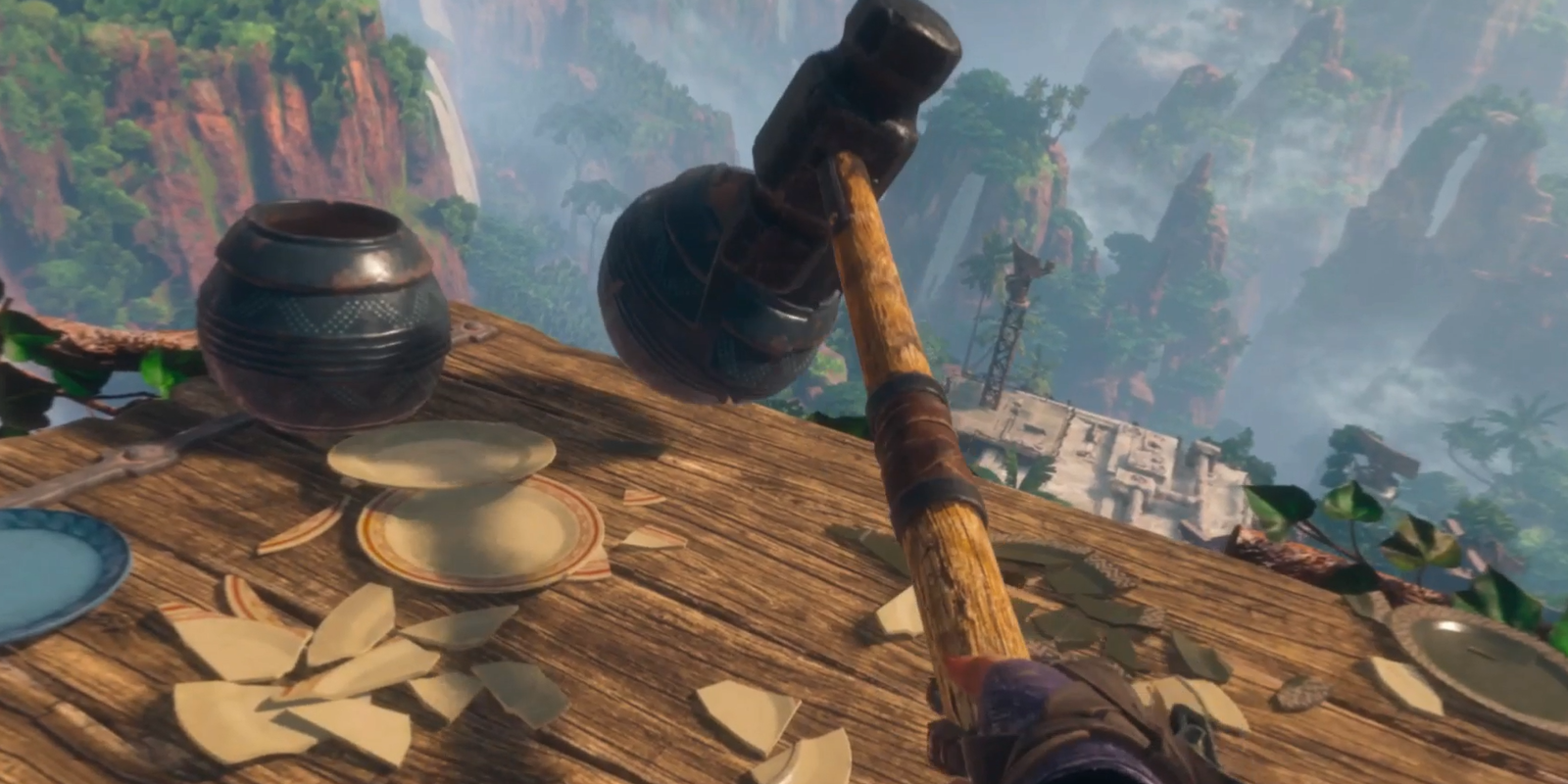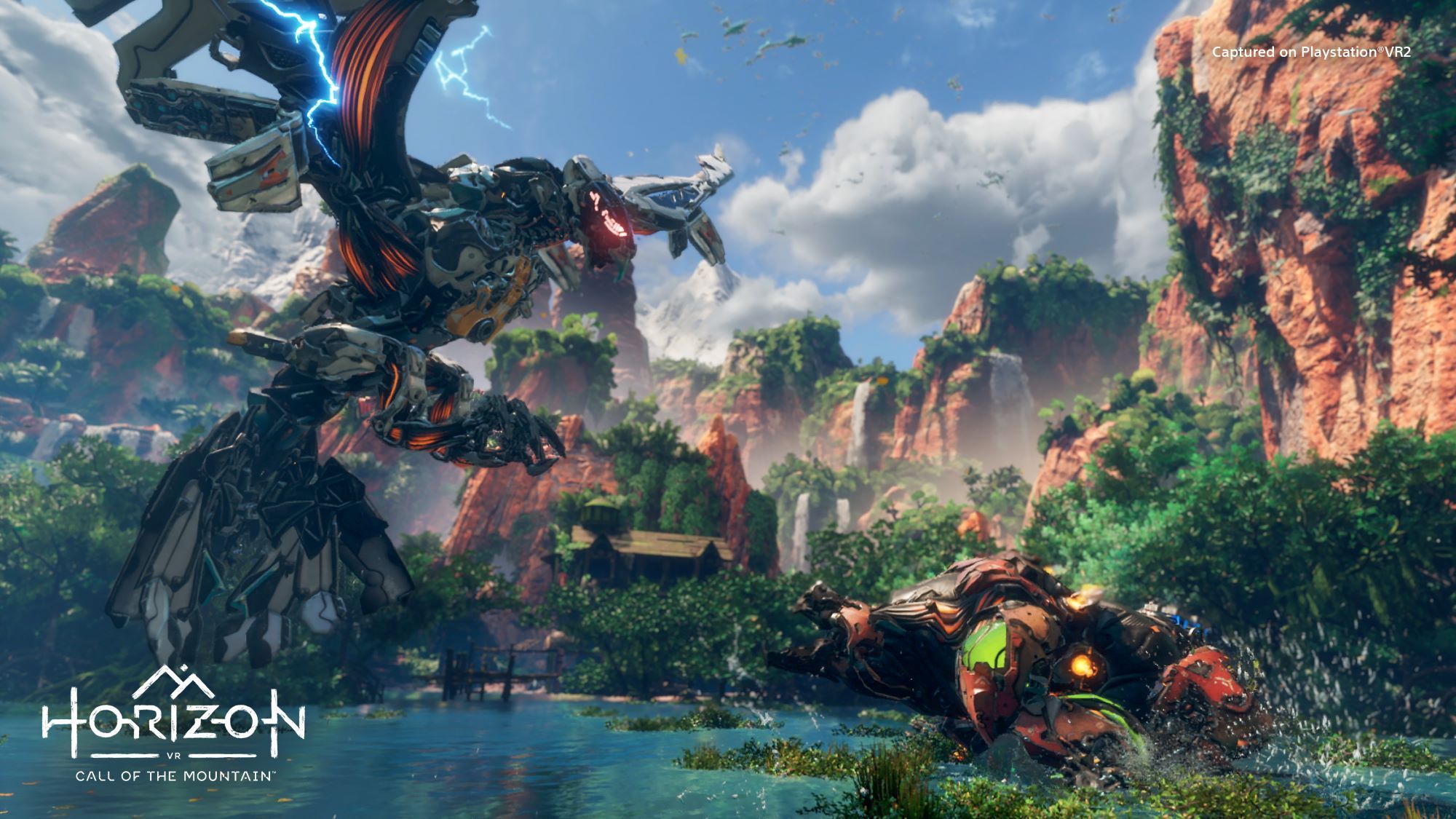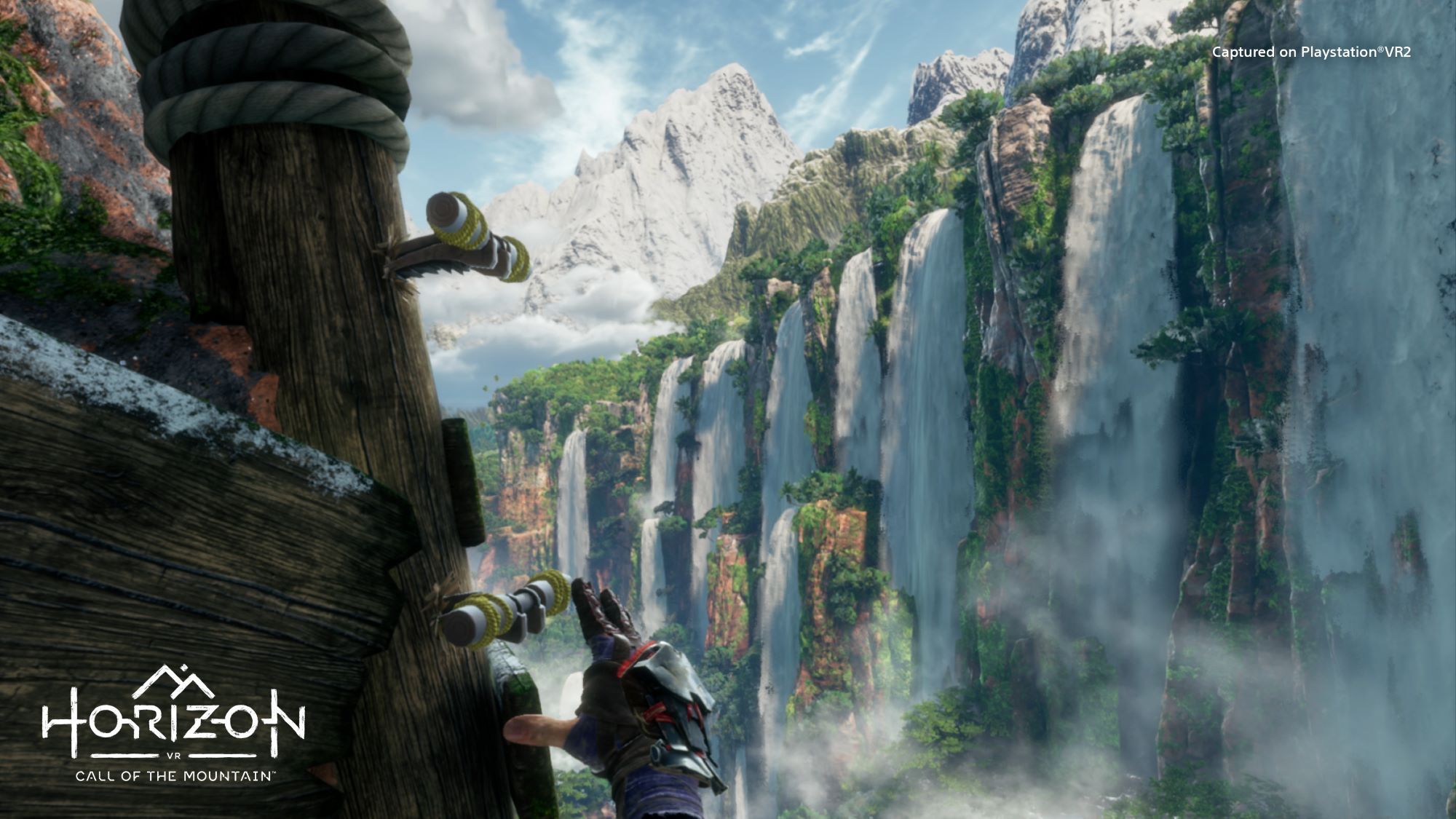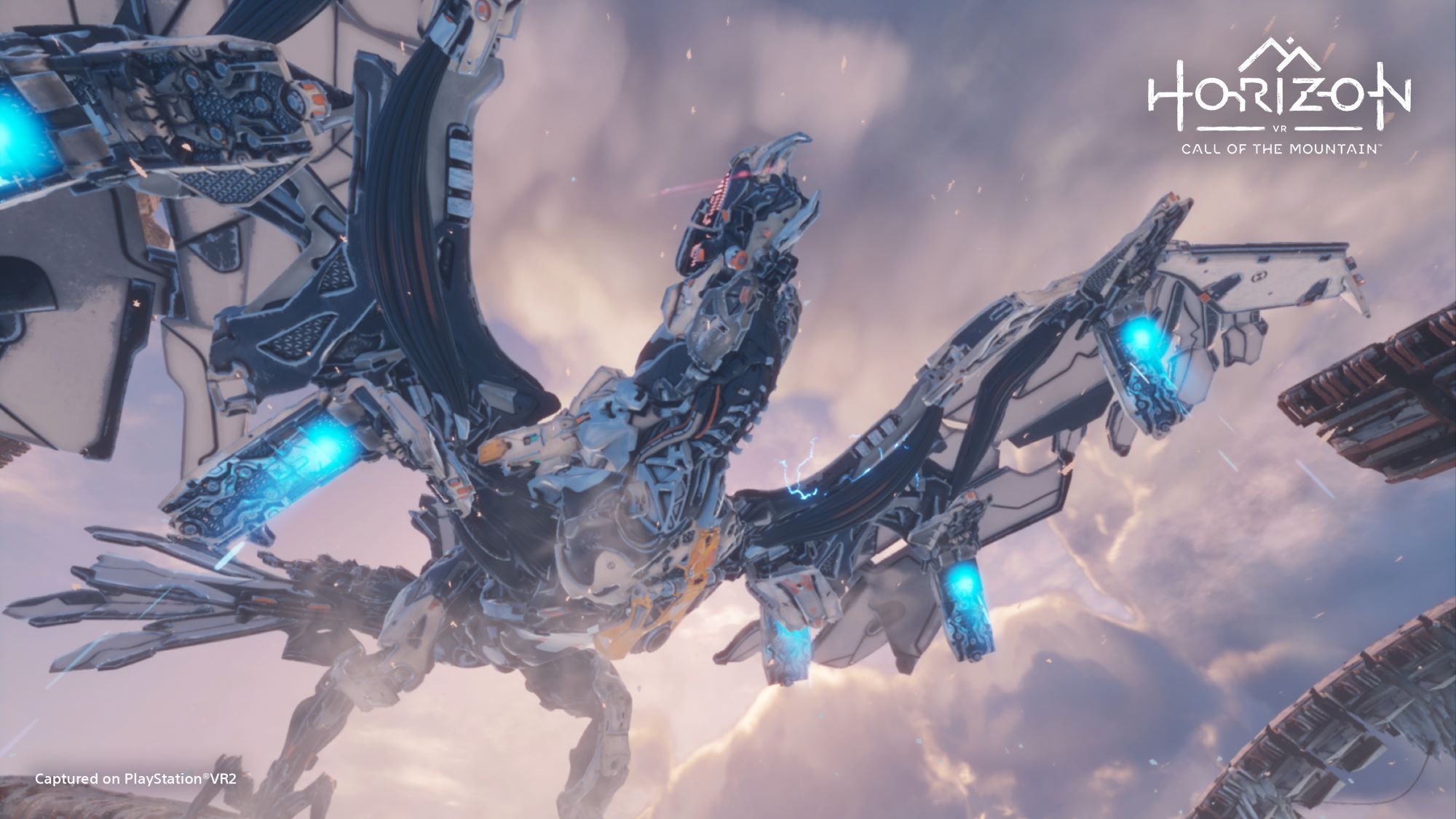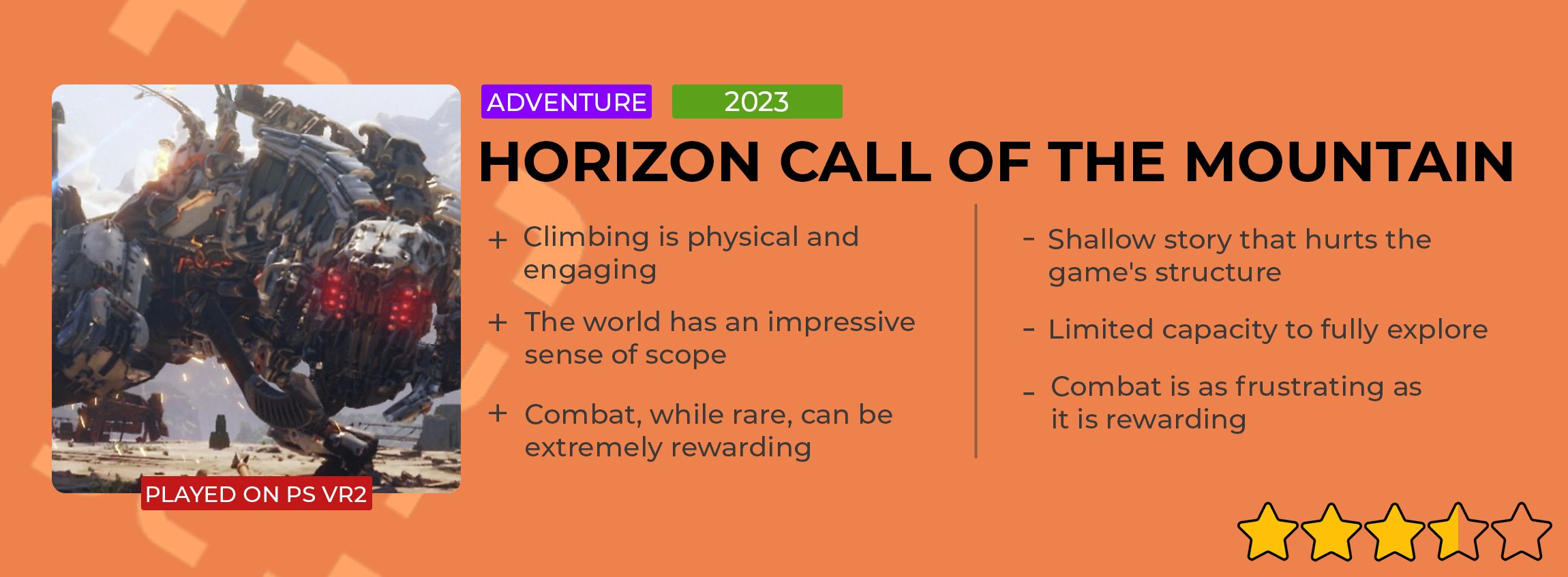Climbing is the central activity in Horizon Call of the Mountain, but it also feels like a fitting metaphor. For some, climbing is all about reaching the peak, standing on the shoulders of God, and conquering nature. For others, it's about the rush of the journey itself. How you feel about that will define how you feel about Call of the Mountain. The destination isn't much, but the road there is peppered with interesting activities, gorgeous views, and new ways to experience both the world of Horizon and the medium of VR itself.
Though it can grow repetitive, making the climbing such an important part of Call of the Mountain was genius. I grew used to the slightly convoluted method of walking while holding buttons and using the stick to turn, but the climbing is instantly intuitive and gives you that sense of mighty heroism Horizon has always traded on. Initially, scrambling up cliffs painted with helpful white smears can feel dull, even if leaning away to look at the world sells the sense of scale. Before long though, you're scaling towers, metal skeletons, jumping chasms, swinging off ropes, opening doors with razor Frisbees, slamming pickaxes into rock, and tossing out well-aimed rope darts to open up the world.
Tying the climbing to the story was less intelligent, I fear. The aim of the game is to keep climbing higher up one basic peak (though the setting does change significantly to suit the colder climes), but every time you hit upon a roadblock or discover something interesting, you're sent back to the start. Thankfully, this trip (and subsequent return where you left off) are done via fast travel over retracing your steps, but it's hard to ever get invested in your progress.
The end result is that Call of the Mountain is a shallow narrative experience. While I would defend Zero Dawn's textured world-building, it lacked much drive and Forbidden West seemed to go off the rails completely. Call of the Mountain may be an overcorrection from that, or perhaps it's limited by the demands of VR. In any case, it's an extremely linear story, and while the few characters you meet along the way are compelling, their arcs feel as if they exist out of necessity.
You play as Ryas, a character so memorable I had to look up his name despite playing the game non-stop for the last week, who is a convicted criminal in the Shadow Carja. It is discovered that your brother has set out on a dangerous quest, and you must follow him up the mountain in order to stop him – do that, and you win your freedom. Despite the fact you routinely backtrack your steps all the way to the beginning while he, the more experienced climber, pushes on, you still manage to keep pace with him.
It's not all climbing though. There's also some combat involved, and while the majority of archery will be shattering hanging targets to get the Trophy or to solve mechanical puzzles, it wouldn't be a Horizon game without a slew of metal beasts to slay.
The boss fights feel similar to the battles you'd endure in 3D platformers in the '90s. There are solid ideas here, but the medium is still too fresh to put them together. While fighting the biggest beasts Horizon has to offer, you'll be locked into position, unable to move freely, with your bow the only recourse. You can dodge by swinging both arms, but this sees you take wild and wayward side-steps with little control over where you'll end up. You can also strafe in smaller steps, but 'can' is generous – this mechanic rarely ever works.
The fighting itself can be troublesome, as you need to turn your bow sideways to select your arrow type, but despite the game offering close control with other smaller tasks, in the fires of the fight it's too easy to pick the wrong one. There are spare arrows, apples (which you must eat to heal by physically raising them to your face), cover, and occasionally extra powerful weapons scattered around these classic boss arenas, but it's always a bit of a crapshoot whether your dodging will land you close enough to any of these to make use of them.
They're flawed in the same way those nostalgic platforming skirmishes were just a set of dull patterns to be repeated quickly without much thought. However, they also feel like the future. Because aiming with the bow is so precise, and because you have total control over what you shoot and where, it's immensely satisfying to rip parts from these beasts, or fell them completely. The tactile nature of VR imbues these victories with a sense of power, and while Aloy carries a miniature arsenal with her and can slow down time or flee to easy vantage points, in Call of the Mountain victories feel earned. They just shouldn't be so frustrating.
These battles are few and far between though. While the later stages of the game ramp up the combat, you barely see any machines at all for the first half. In the console Horizons, Aloy is constantly picking fights, either to find/upgrade gear, clear quests, or just defend herself. Here, combat only appears at agreed upon, choreographed moments. The exploration is a much bigger part of the experience.
Unfortunately, this exploration is limited too. Not only is Call of the Mountain both linear and often entirely vertical, it also stops you from backtracking. Part of this is no doubt down to VR – it's much easier to make a third-person character model scramble back down a cliff than it is to let a first-person perspective perform it in VR. But it also seems too loyal to the inflated urgency of its narrative, and backtracking to replay earlier locales from base camp is locked until you finish the game. Considering Aloy can run freely through the fields of barley while the fate of the world is at stake, it seems like a mistake to not let me fully explore my favourite spots and sweep the collectibles just because you need a radio part.
Call of the Mountain has wonderful elements to it, and it lands the most important part – the physical experience of climbing – perfectly. Trailers and even my own video capture don't quite convey the speed and agility you feel while scrambling. Unfortunately, other parts of the game are too thin, with the inability to wander back the way you came and the constant stop-start nature of its thin narrative working against its own appeal. With some fresh ideas, huge scope, and clever adaptation of an existing property without relying on a simple remake, Horizon Call of the Mountain is an important game for VR. However, I'm not sure it's a great one.
Score: 3.5/5. A PS VR2 code and headset was provided by Sony for this review.
Source: Read Full Article
